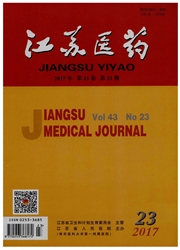

 中文摘要:
中文摘要:
目的探讨甲状腺功能正常的年轻人血清促甲状腺激素(TSH)水平与代谢综合征的关系。方法年轻志愿者216名,年龄18-40岁,TSH水平在正常范围(0.3-4.5mU/L)。以TSH〉2.5mU/L作为上界参考值,分为高TSH组(A组,TSH 2.6-4.5mU/L,59例)和低TSH组(B组,TSH 0.3-2.5mU/L,157例)。分析两组患者TSH水平与代谢综合征的关系。结果 A组代谢综合征、中心性肥胖和高脂血症的发生率高于B组(13.6%vs.3.2%、23.7%vs.12.7%和11.9%vs.3.2%)(P〈0.05)。收缩压、舒张压和甘油三酯水平与TSH水平呈正相关(P〈0.05)。结论在TSH处于正常范围的健康年轻人群,TSH〉2.5mU/L的个体应常规评估是否患有代谢综合征。
 英文摘要:
英文摘要:
Objective To investigate the relationship of serum levels of thyroid stimulating hormone(TSH) and metabolic syndrome in euthyroid young people. Methods Serum TSH was examined in 216 young volunteers aged 18 to 40 years old). Taking TSH〉2.5 mU/L as a cut-off uplimit of TSH, the patients were assigned into two groups of A(TSH 2.6-4. 5 mU/L, 59 cases) and B(TSH 0.3-2.5 mU/L, 157 cases). The relationship of serum levels of TSH and metabolic syndrome was compared between two groups. Results The incidence rates of metabolic syndrome, central obesity and hypertriglyceridemia were higher in group A than those in group B(13.6% vs. 3.2%, 23. 7% vs. 12. 7%,and 11.9% vs. 3.2%)(P〈0. 05). The systolic and diastolic blood pressures and triglycerides were positively correlated with serum levels of TSH(P〈0. 05). Conclusion Healthy young people with serum TSH〉2.5 mU/L should be assessed for the presence of metabolic syndrome even if their TSH levels are in the normal range.
 同期刊论文项目
同期刊论文项目
 同项目期刊论文
同项目期刊论文
 期刊信息
期刊信息
